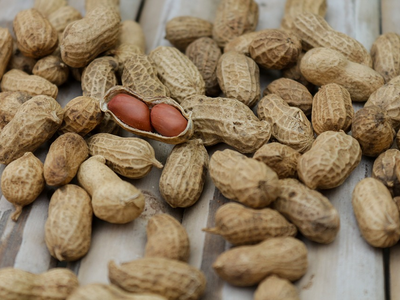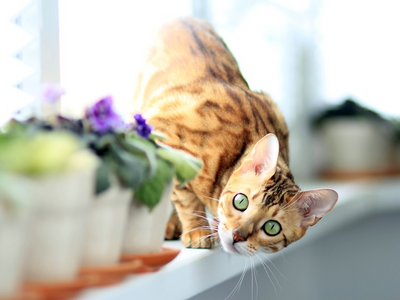24.09.2021
Cat or cow? Why do cats eat grass?
If your kitty is allowed to roam outside, you will more than likely have seen them grazing happily in the garden.
Even indoor cats are prone to the occasional nibble from your house plants as a side salad to what they usually eat.
This isn’t necessarily a problem—or the expression of your cat’s secret desire to turn into a cow—but it is usually accompanied by the prompt regurgitation of your kitty’s breakfast on your best carpet. This isn’t pleasant—especially as your kitty seems to do it right when you’re about to leave the house.
Why do cats eat grass on top of their regular diet? There is no hard-and-fast answer, but Untamed has the most likely reasons and advice on what you can do about it.
Cats eating grass—why do they do it?
Nobody is quite sure why cats feel the urge to eat grass.
There are several theories, all of which may be true, but spokescats for feline representative groups have yet to go on record with a definitive answer.
One thing seems certain—cats don’t eat grass for nourishment, and there is no evidence of a trend towards kitties going vegan. Cats are obligate carnivores, so their diet must contain a healthy proportion of meat to keep them healthy. Vegetables aren’t required for a kitty to meet their daily nutritional needs.
They also lack the enzymes to digest grass, meaning that any patches of your lawn they eat will:
- Pass through the gut and come out the back end
- Sit in the stomach until they are launched forwards onto your rug, bed, or lap
Your cat keeps eating grass—the theories why

The great outdoors—time for a snack?
Photo credit: Pixabay @ Pexels
There are several reasons—all plausible, but none definitively proven—why cats eat grass:
- Getting folic acid
- Helping with digestion
- Relieving an upset tummy
- Hereditary behaviour
- Relieving stress
Getting folic acid
Grass is a natural source of folic acid, a vitamin that is used in the production of haemoglobin.
Haemoglobin transports oxygen through the bloodstream, ensuring that a kitty’s organs and muscles are plentifully supplied.
If your feline friend senses a need for folic acid, they may be tempted to chew on grass to supplement the intake of the vitamin.
Helping with digestion
We all know that hairballs are a common occurrence in our furry friends.
Depositing moist lumps of fur behind the curtains doesn’t get rid of all the hair your kitty has eaten, though, and some will inevitably pass into the gut.
Eating grass could be your furry friend’s way of easing the passage of hair through their intestines. They can’t break grass down, so small slivers of it may pass through their body, binding hair and other indigestible material to it as it travels.
The grass, together with the fur that has passed into the gut, is then passed out of the back end and lands in your kitty’s litter tray.
Relieving an upset tummy
If your feline friend has eaten something a bit dubious, they may be suffering from indigestion, stomach pain, or an allergic reaction.
This could also be a result of over-enthusiastic grooming, meaning that a hairball is on the way.
As grass is indigestible for a cat, eating it often results in vomiting—which means that not only grass but all the other indigestible material in your cat’s tummy is regurgitated at the same time.
Where it lands is a different matter.
Hereditary behaviour
There is evidence to suggest that eating grass increases peristalsis, which is the circular muscle movement that pushes matter through the intestines.
While your furry friend probably doesn’t have any parasites—regular deworming takes care of that—eating grass may be a throwback to the time when cats lived in the wild, not as pets.
Intestinal parasites are common among predators in the wild, and your kitty may be eating grass because that’s what his ancestors did to expel them.
Relieving stress
Much like we eat comfort food when we experience anxiety, cats may chew on grass to relieve stress.
Cats that regularly munch on grass may be displaying displacement behaviour. You may want to investigate whether something is causing them stress if your kitty is also:
- Seeking solitude
- Over-grooming
- Being uncommonly vocal
- Disengaging from the family
- Being unusually aggressive
Do cats need to eat grass?
There is no nutritional benefit to a cat eating grass, apart from the possibility of:
- Increased folic acid
- Help with digestion
Your kitty can get the vitamins they need from the following sources:
|
Vitamin Type |
Sources |
|
Fat-soluble |
|
|
Water-soluble (B complex and C) |
|
If your cat food uses high-quality, meat-based ingredients, they should be getting all the required vitamins in abundance.
There is no danger of overdosing as excess vitamins are excreted in urine and faeces.
The only watch-out is feeding your cat too much vitamin A because felines can’t easily regulate the amount they retain, and too much can lead to abnormal bone growth around the spine and front legs.

That’s better….now to find a nice rug
Photo credit: Pixabay @ Pexels
Is your cat eating grass, not food?
If you notice that your cat is avoiding their normal food but is eating grass, there may be an issue that needs investigating.
The possible reasons for this behaviour are:
- A recent change in diet
- Eating something they shouldn’t
- An organ issue or other disease
A recent change in diet
Have you recently swapped to a new brand of food? Your kitty may be feeling a bit nauseated because they’re not yet used to it. Many of the tummy upsets a cat experiences are due to a change in the protein source in the food—a good way to avoid causing them distress is to gradually transition over a week rather than swapping from one day to the next.
If the change was from a lower-quality food to a high-quality, meat-based diet, they may be getting so much energy from the new food that they don’t feel the need to eat more for the time being. This will sort itself out as they use up energy, and the appetite should return.
If they’re feeling nauseated, they may be eating grass in an attempt to clear their tummy of something that is irritating it.
Eating something they shouldn’t
You should check whether they’ve been out hunting—birds or rodents they have caught and devoured may make your cat feel a touch queasy.
Your kitty may also have got into the rubbish—not necessarily at home, but possibly at a neighbour’s house.
If your cat habitually roams around when you’re not watching them, there is no telling what sort of mischief they get up to. You may only experience the cuddles, nap attacks, and playfulness at home. Your furry companion may be the neighbourhood gangsta without you knowing it—however implausible that may sound.
An organ issue or other disease
If your feline friend refuses their food but continues to eat grass for a longer time, you may want to have them checked out for an underlying health issue.
They may be suffering from:
|
Possible illness |
Explanation |
|
Bowel obstruction |
There may be a bone or foreign object lodged in your kitty’s gut that they’re trying to get rid of by eating grass |
|
Acid reflux |
Indigestion, or acid reflux, could be leading them to eat grass in an attempt to balance the acidity in their tummy. You can help by giving them an antacid to see if it solves the problem |
|
Pancreatitis |
Your kitty may be suffering from chronic or acute pancreatitis—although this mostly affects older cats |
|
Allergic reaction to food |
Something in your kitty’s diet may be causing an allergic reaction—this can easily happen if you have recently changed diets |
|
Inflamed bowel |
Bowel inflammation can be caused by bacteria—such as salmonella or E. coli—as well as worms or parasites |
|
Kidney or liver problems |
Kidney or liver disease can reduce a cat’s appetite to zero from one day to the next. They are difficult to detect without specific tests, and you only notice that there is a problem with the kidneys once about 75% of their function has been lost |
A vet will be able to test for all of the above conditions. If you’re worried, it’s well worth a quick trip to set your mind at rest and catch any problem before it escalates.
What about indoor cats eating house plants?

I wonder if this tastes good...
Photo credit: Cottonbro @ Pexels
Much like they occasionally try to eat cheese, chocolate, or strawberries, indoor cats sometimes take a leaf out of your house plants—this is the same behaviour as eating grass but brings with it added risks.
While the most common house plants are no more harmful than your lawn, there are a few you should make sure can’t be turned into an impromptu meal.
The house plants that are toxic to cats are the following:
- Azalea
- Easter lilies, tiger lilies, and daylilies
- Croton (Joseph's Coat)
- Narcissus daffodils
- Caladium
- Dieffenbachia
- Rubber plants
- Weeping fig plants
- Philodendron
- Swiss cheese plant
- Oleander
- Poinsettia
- Christmas Cherry
- Holly berries (be careful around Christmas!)
The safest way is to avoid buying any of these, but you can also wrap tinfoil around the base and stem to make it more difficult for your kitty to get into a plant pot.
Keeping a regular supply of fresh water also means that your kitty may not be tempted to chew leaves to get the moisture out.
Is there such a thing as cat grass?
Kitties doing bovine impressions isn’t necessarily a problem—the worst aspect of it is often the resulting clump of cat sick in the middle of your pillow.
If your feline companion insists on munching grass but is otherwise eating normally, there are a few things you can do to make sure what they’re doing is safe.
- Avoiding pesticides and chemicals
- Growing your own cat grass
Avoiding pesticides and chemicals
If you or your neighbours use any pesticides or chemicals on the lawn, you need to make sure your kitty is kept well away from them.
At best, lawn chemicals, such as fertilizers, can produce toxic reactions in cats. At worst, some pesticides can be fatal.
Studies have shown that most chemicals take up to 48 hours to become untraceable after they have been used in your garden, so the safest route is to make sure your furball is kept indoors for that time.
You may also want to try getting your neighbours to alert you whenever they intend to use any potentially harmful chemicals.
Growing your own cat grass
If your kitty sees Shaun the Sheep as a role model, you can try growing your own cat grass at home.
Cat grass is usually grown from:
- Rye
- Barley
- Oats
- Wheat
Cat grass kits are available in most pet shops and are easy to use—just add water and sunlight, and your kitty can nibble on a green treat at home in no time.
Maintaining a healthy diet can help reduce the desire for grass
Eating grass is a natural thing for cats to do, so you shouldn’t be too worried if your feline goes grazing every so often.
Bearing in mind the reasons why cats eat grass, though, a healthy diet may go some way towards removing your kitty’s desire to mow your lawn.
A good diet for cats takes account of their heritage, nutritional needs, and taste for meat.
The optimum nutrition for your feline companion should consist of:
|
Healthy cat nutritional elements |
Explanation |
|
Protein |
Cats need a high proportion of proteins in their diet to cover their amino acid requirements and generate energy. Amino acids are the building blocks of muscle, skin, and hair, and your kitty’s system is best able to metabolise animal proteins, the healthiest of which are:
Vegetable protein sources are nowhere near as efficient at giving cats the amino acids they need, so they would have to eat considerably more of a cereal-based food to cover the requirements |
|
Fat |
Animal fat provides essential fatty acids needed for various organ functions and also makes cat food taste great. It also delivers energy, although proteins should be your feline’s preferred energy source |
|
Vitamins |
Your cat needs the full spectrum of vitamins, although they can produce vitamins K and C themselves. Vitamins help resist disease and act as catalysts for chemical reactions in the body |
|
Minerals |
Your feline friend needs minerals, such as:
|
A healthy diet—whether in dry or wet form—can help take away a cat’s desire to eat grass with:
- Better digestion
- Sufficient levels of vitamin B9 (folic acid)
- Fewer upset tummies thanks to high-quality ingredients
Untamed can help with a healthy diet for your feline friend

This is better than grass any day!
Image (c) Untamed
Grass who? Untamed cat food is formulated to give your kitty the best nutrition, the right portions, and heavenly taste that come with both our jelly and gravy meals.
Our promise is that we:
- Only use human-grade ingredients—We don’t use highly-processed sources of meat or animal derivatives, and we make sure that all our ingredients would happily sit on your plate, too!
- Steam-cook our meals—We don’t destroy nutrients with aggressive cooking methods but gently steam-cook our meals to make sure all the goodness is preserved for your kitty
- Get our formulas designed by vets—All our recipes are formulated by vets to ensure your best friend only gets the right nutrients in the right proportions
- Load the proteins—Our meals contain twice the amount of animal protein you would expect to see in other cat foods
- Look after sensitive cats—Our meals use fresh and natural ingredients, and we also ditch chemical taste enhancers, harsh preservatives, and hard-to-digest fillers, like grains and animal derivatives, so even sensitive cats will be able to eat them with no worries
Numerous cats enjoying a healthy Untamed diet have become healthier and happier cats. Here's what you can expect if you make the switch:
- From the word go, your kitty should be creating less mess in their litter tray
- After two months, they should be more energetic and have better muscle tone
- After four months, you may notice how shiny their coat is and that they are producing fewer hairballs
- For the rest of their life, you will see their energy, natural weight control, and general well-being as a result of their great diet
Don’t take our word for it, though—try us out and see how your kitty goes wild for Untamed’s food!
Test the Untamed difference for yourself right meow!
Untamed is committed to treating your feline friend as the most important cat in the world.
As well as making sure every meal is bursting with the highest-quality ingredients, we will create a tailor-made meal plan for your kitty, taking into account their life stage, taste preferences, sensitivities, and allergies.
Trying out our me-wow food is easy—all you have to do is visit our online cat food store and do this:
- Fill out our Try Now questionnaire and enter details about your kitty
- Review the meal plan
- Place your order
Your feline friend will get their packages delivered to your door in no time, and you can relax as they tuck into healthy, delicious meals.
If our meals click with your kitty, we will replenish your Untamed stash around the same time each month. Our monthly cat food shipping is free and our packaging is eco-friendly. You can modify, postpone, or cancel any particular order anytime!

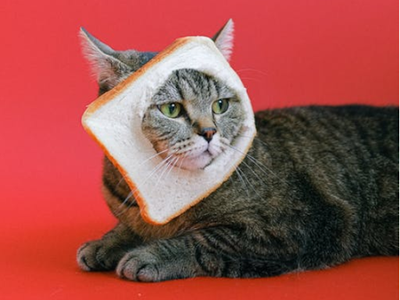
![Associated image for Best food for Ragdoll cats in the UK [Broken Down]](http://untamed.com/cdn/shop/articles/featured_best_food_for_ragdoll_cats_uk_400x300_crop_center.jpg?v=1646818249)
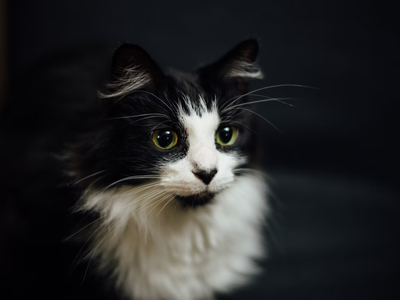
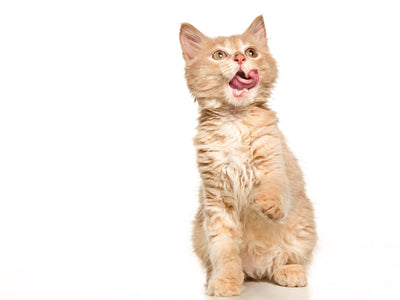
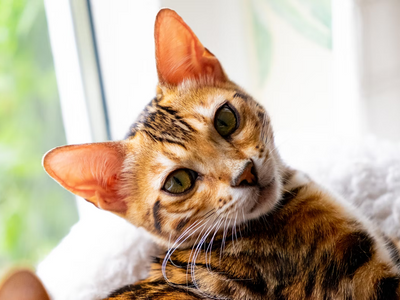
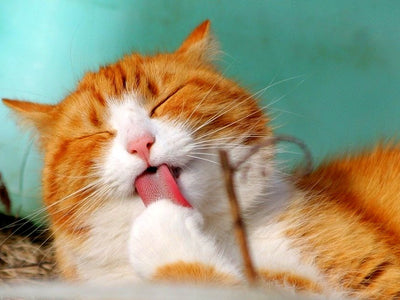
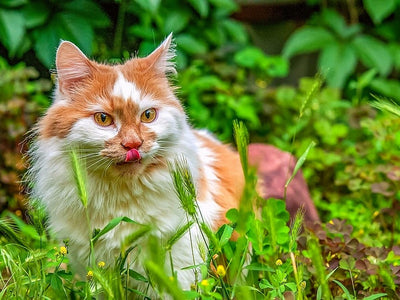
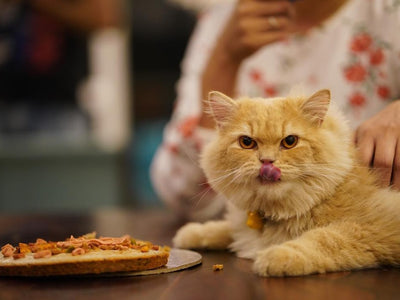
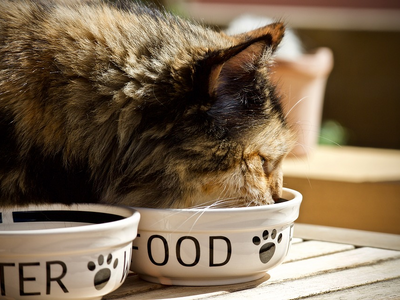
![Associated image for What human food can Sphynx cats eat? [Comprehensive list]](http://untamed.com/cdn/shop/articles/what_human_food_can_sphynx_cats_eat_Featured_400x300_crop_center.jpg?v=1648705074)
